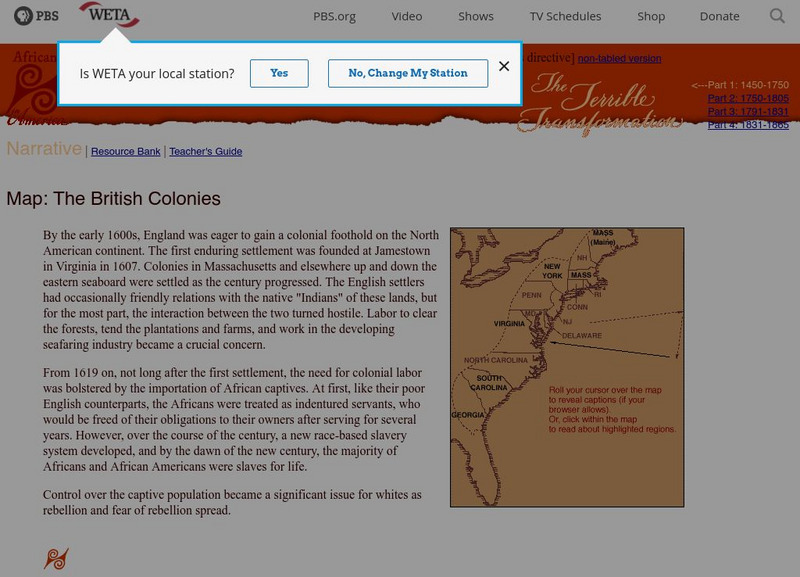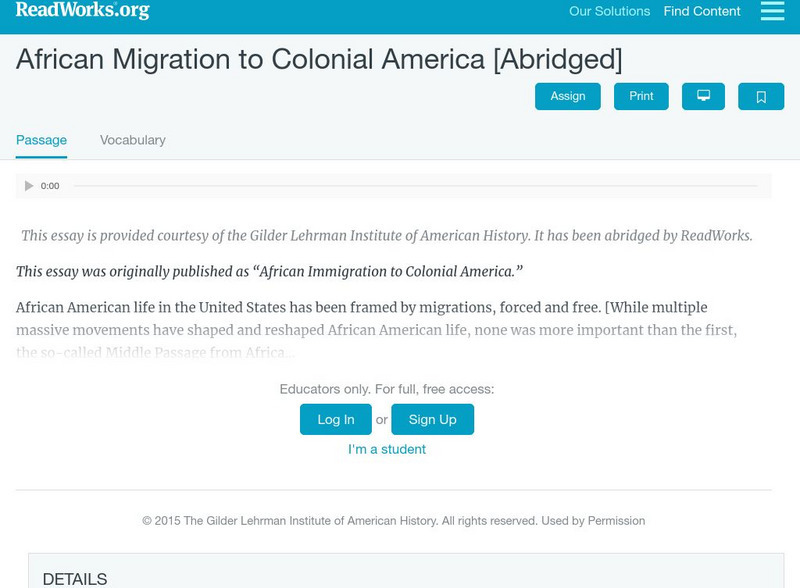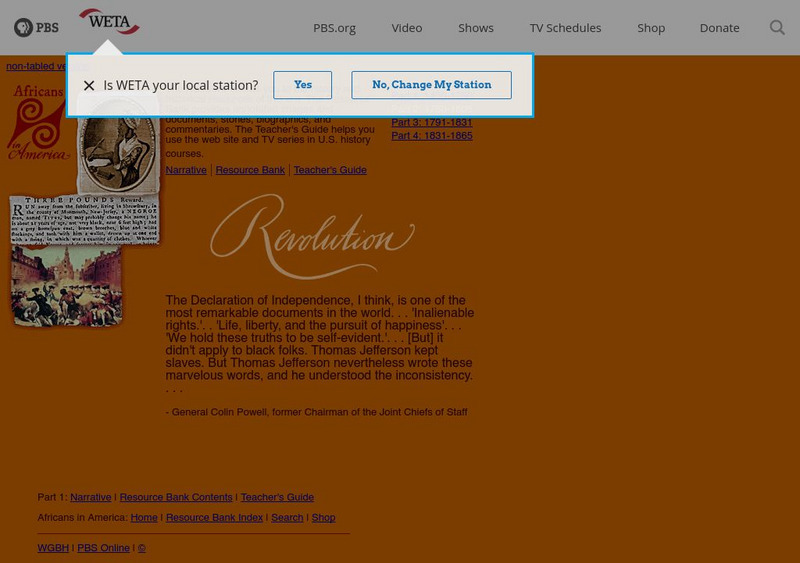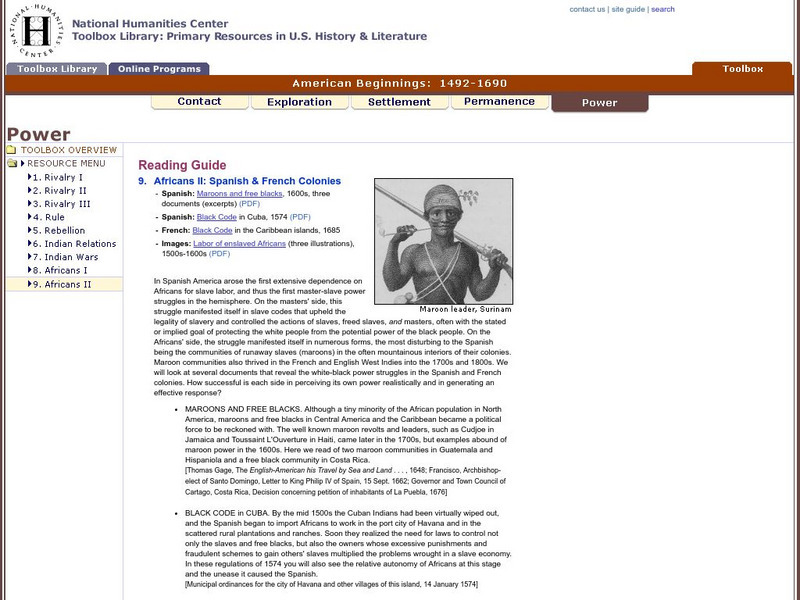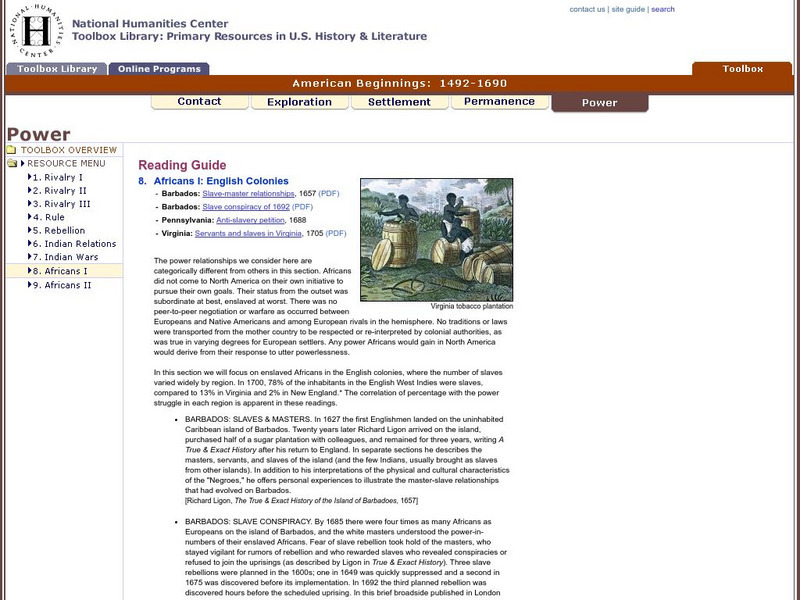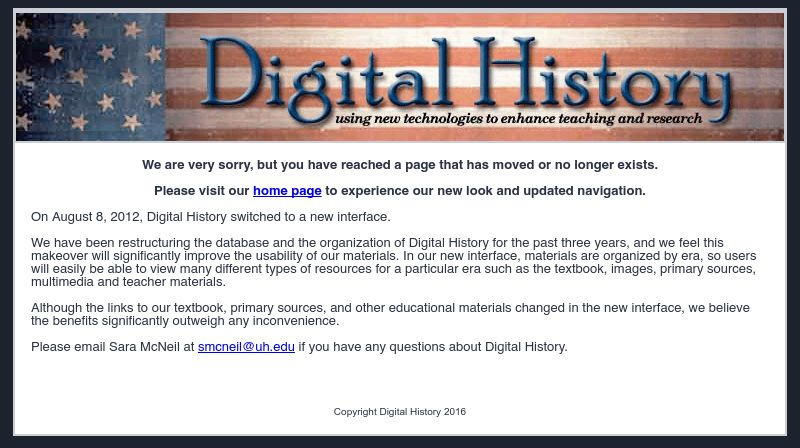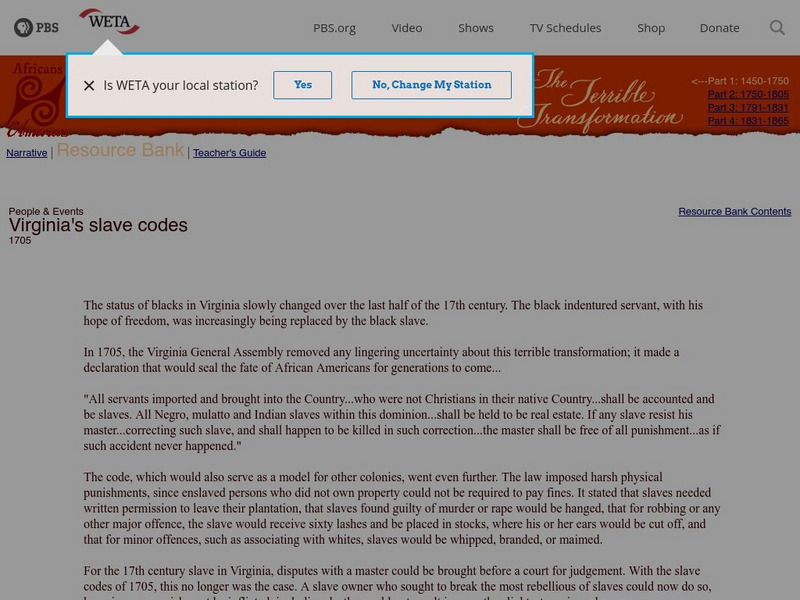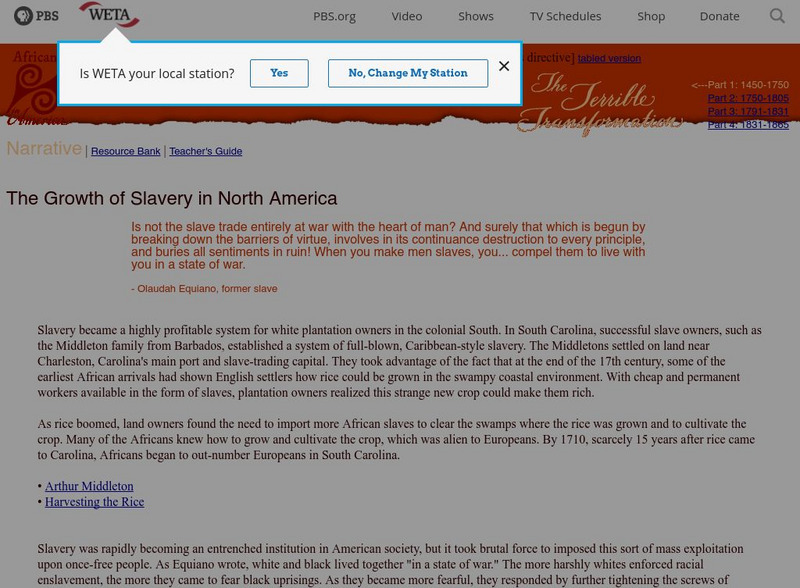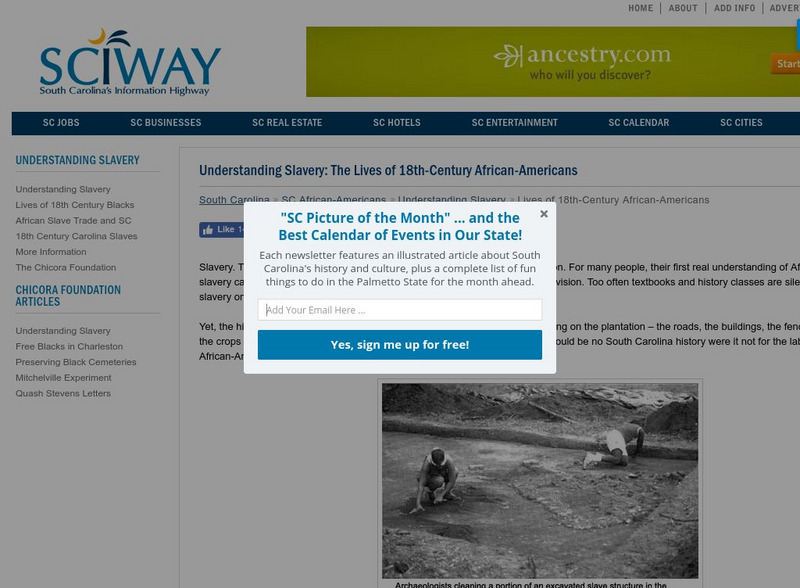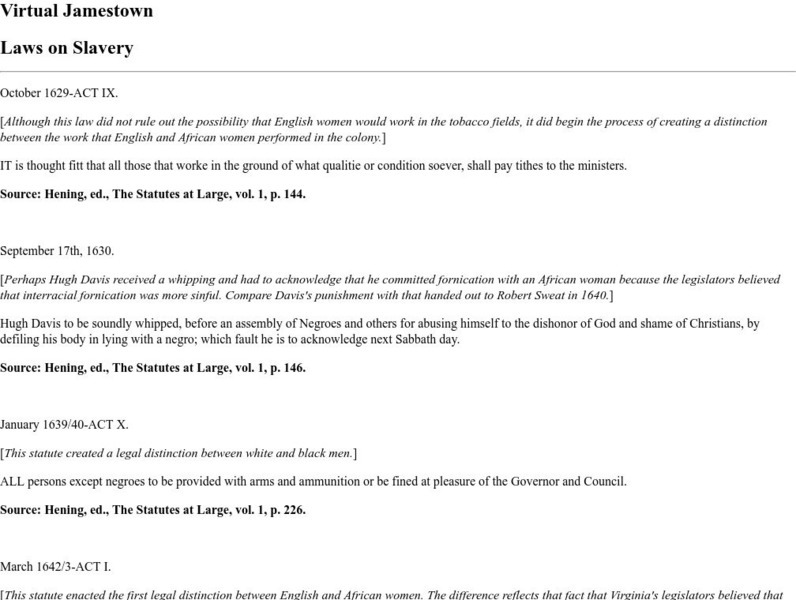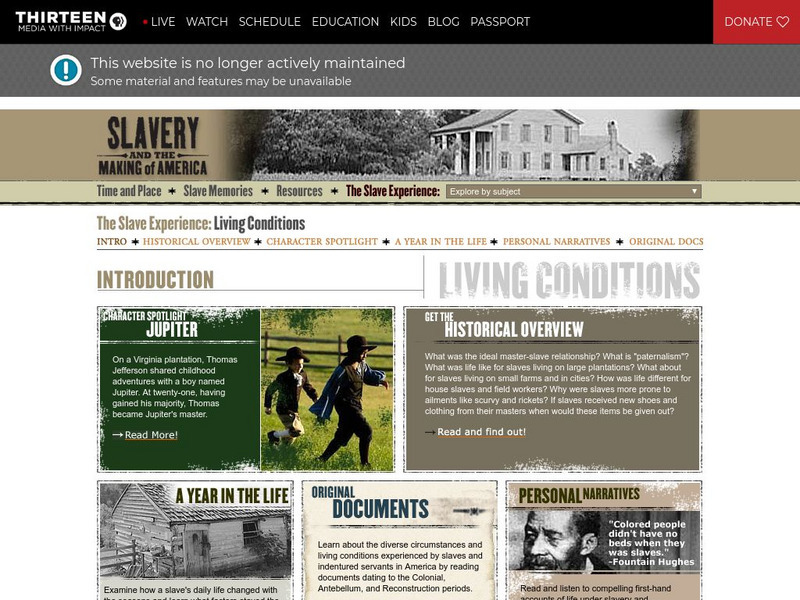PBS
Africans in America: Map of the British Colonies
Map of British Colonies and information from PBS on slavery from about 1600 to 1750. Some timelining of African American's lives in the New World.
Read Works
Read Works: Passages: Olaudah Equiano
[Free Registration/Login Required] Students read information about and an excerpt from The Interesting Narrative of the Life of Olaudah Equiano, or Gustavus Vassa as well as "African Migration to Colonial America" and answer paired text...
Library of Congress
Loc: America's Story: Phillis Wheatley, Poet
A brief look at the fascinating life of African American poet, Phillis Wheatley. Provides two portraits, and a sample page from Wheatley's collection of poems.
World Atlas
World Atlas: Africa
Learn about the history of Africa including Ancient Africa, African colonization, slave trade, and Post-Colonial Africa. Also covers maps, geography, countries, and interesting facts.
Library of Congress
Loc: American Memory Timeline: Colonial Settlement,1600s 1763
Read about the colonization in the New World by many European countries. Hyperlinks to you to more specific topics.
Khan Academy
Khan Academy: Us History: 1491 1607: African Societies and Atlantic Slave Trade
The beginning of the Atlantic slave trade uprooted previously established societal norms in West Africa.
British Library
British Library: Discovering Literature: Voices in the Campaign for Abolition
From the mid 18th century, Africans and people of African descent - many of them former slaves - began to write down their stories. This article describes these writings and assesses their role in the abolition of slavery.
PBS
Africans in America: William Byrd's Diary
Excerpts from "The Secret Diary of William Byrd" in which, among other things, he describes slaves as piece of property.
PBS
Africans in America: Revolution: 1750 1805
Part of a detailed PBS site which describes "the history of racial slavery in the United States, this section focuses on slavery from 1750-1805.
National Humanities Center
National Humanities Center: Toolbox Library: Africans Ii, American Beginnings: 1492 1690
Three illustrations and five documents about slave codes, master-slave power dynamics, and free blacks within French and Spanish settlements of the Caribbean.
National Humanities Center
National Humanities Center: Toolbox Library: Africans I, American Beginnings: 1492 1690
Four accounts of the complex power relationships between slaves and slave holders within English colonies in Barbados, Virginia and Pennsylvania, as well as documents about slave revolts and anti-slavery agitation.
Digital History
Digital History: The Diversity of Colonial Slavery
Read about the three distinct systems of slavery that developed in the colonies based primarily on the crops that were grown in each region. See how the system affected the way the culture of slaves grew out of the region.
PBS
Africans in America: Virginia's Slave Codes (1705)
This website describes contents of the Virginia Slave Codes of 1705 with excerpts from the orginal law.
PBS
Perceptions of African Identity: Swahili Coast
From the PBS series, a history of the Swahili coast of East Africa, including the island of Zanzibar.
PBS
Pbs: Africans in America: Part 1: The Growth of Slavery in North America
Focuses on slavery in North America, the worry about uprisings, and slavery's economic impact. Links to related information.
Other
Understanding Slavery: The Lives of Eighteenth Century African Americans
Comprehensive description of slaves in South Carolina. Click on the topics on the left to take you to a wealth of information about the lives of slaves in South Carolina.
Columbia University
Edward Wilmot Blyden
The life and work of E.W. Blyden (1832-1912 CE), one of the main leaders in the Pan-Africanism movement in Africa.
National Humanities Center
National Humanities Center: Teacher Serve: Three Worlds, Three Views
Essay examining the cultural and environmental changes spanning 300 years in the pre-Revolutionary South as three worlds, Native American, European, and African collide. Site includes guiding questions for student discussion and scholars...
Other
Virtual Jamestown: Laws on Slavery
This site provides the original text of Virginia colonial laws concerning different aspects of slavery for Africans, Native Americans, and indentured servants.
University of Pennsylvania
University of Pennsylvania: French in West Africa
This site has historical information about West Africa and the French colonial presence in the 19th and 20th Centuries.
Jamestown-Yorktown Foundation
History Is Fun: Cultures at Jamestown [Pdf]
A six-page discussion of the mix of cultures that converged in the colony of Jamestown and the challenges this presented. These cultures were the English settlers, the indigenous Powhatan people, and the African slaves. Despite many...
PBS
Wnet: Thirteen: The Slave Experience: Living Conditions
This PBS series site reveals the diverse circumstances and living conditions experienced by slaves and indentured servants in America by reading documents dating to the Colonial, Antebellum, and Reconstruction periods.
Smithsonian Institution
National Museum of Natural History: Written in Bone: Forensic Files of the 17th Century Chesapeake
This very thorough site will fascinate those interested in forensic anthropology. You will learn what you can read from bones, how a face can be reconstructed from a skull, clues you can read from a burial, and about forensic cases both...
Curated OER
Educational Technology Clearinghouse: Maps Etc: Pre Colonial Africa, 1885
A map of the African continent prior to the Berlin Conference of 1885, when the most powerful countries in Europe at the time convened to make their territorial claims on Africa and establish their colonial borders at the start of the...


